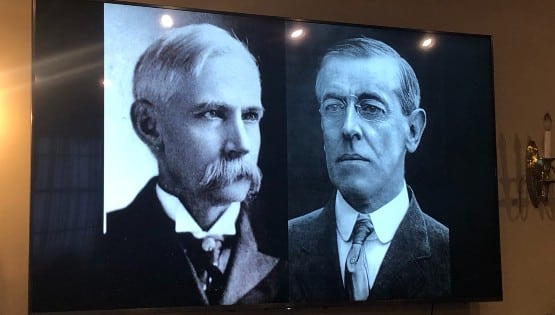
Why? Don’t we know, from schools to streets, that public consolidation can have a positive effect. Economists call it economies of scale. A selectively combined government work force can be a very effective public tool. It can lower taxes and bring in new employment. And we all know that an expensive piece of equipment sitting in a public garage of one jurisdiction does little good for the jurisdiction next door who could use it – but can’t.
So why don’t we start consolidating local services for the Rockbridge area instead of having three of almost everything? We expect local fire departments to respond wherever they are needed. Why not public works departments? And school support staff?
The answer my friend is not blowing in the wind. It is, as you already know, political.
But to just say “that’s politics” is never a good answer. So let’s search for others. Here are four. First, there is no public ground swell toward consolidation. Secondly, there is no taxpayer revolt. (At least, not yet.) Third, we do not have a clear list of cost savings for each type of consolidation. However, thanks to former county supervisor Roy Fauber and the July Rockbridge Advocate, we have comparisons in spending between Botetourt County, with a single local government, and the Rockbridge area, with three local governments.
As for the fourth reason: there is the belief that last year’s budget was an anomaly, times will be better next year. But history tells us otherwise. It tells us that each year budgets become more difficult to balance. Yet our local elected officials keep telling themselves – and anyone on the street willing to listen – that in passing the current budget we drew the line and set limits on new programs. How can that be when county lines and city limits determine what is in any local budget?
Explain this to your children: The City of Lexington and the County of Rockbridge will likely spend up to $35 million on reconstructing two middle schools – two schools less than a mile apart, when a single consolidated facility could better serve these kids at a lower cost. Meanwhile, renovating Lexington’s Waddell Elementary School – being kept afloat by county transfer students – has been cut from the city’s capital budget. Is this how we treat our children? Let the tiny tots wait for better facilities while their older brothers and sisters attend two modernized schools. Shameful.
So, why we are putting town status for Lexington and Buena Vista on the back burner? That’s easy. As a Lexington City Council member told a Rockbridge County supervisor, “We (the city) are different than you (the county). We’re an academic community.” At least the Lexington gentleman was polite. He did not say “better.”
There’s more. A word is missing for a local high school that serves 1,057 Lexington and Rockbridge County students. It is, of course, “Consolidated.”
And you know that big red brick building downtown, the one with the empty garage across the street from a busy garage, the “H&J Courthouse?” Everyone knows that it serves both Lexington and Rockbridge County, but someone forgot to tell the stone masons. There is no “Lexington” along with “Rockbridge County Court House” between two fake columns. (Yes, the columns are hollow.)
By now you may say that we have overlooked the joint services agreements. We have not. Band-aids are for cuts; not for linking organs. Or you may still be gloating over BV’s fiscal plight. However, your home town may be next. Check out the state of municipal finance across the nation. Municipalities are selling everything from parkland to fire engines. Buena Vista is merely in the pawn shop business. And Lexington is now in the business of increasing fines and restricting parking as part of its effort to change the perception of being anti-business into reality.
Time to stop. We all have budgets. Ours is words. So, let’s wrap up this piece.
Step-by-step consolidation of common services is a way out of the independent city status our commonwealth has imposed on us. It allows us to punt on the volatile issue of town status for our two independent cities. With consolidation of services all three local jurisdictions can maintain their vital civic pride, keep government close to home and save the taxpayers a bundle.
Let’s get started. Let’s act before another financial bath forces elected officials to come clean with the voters on duplication and waste.
Column by David Reynolds










